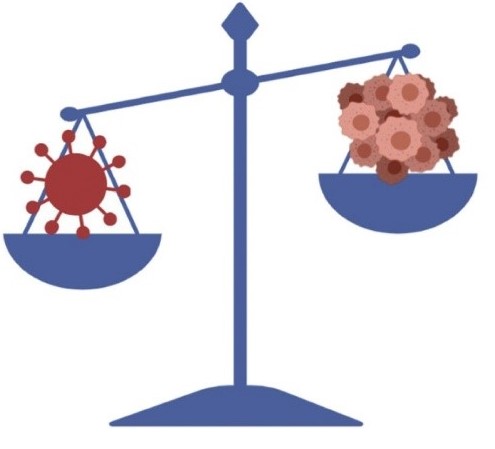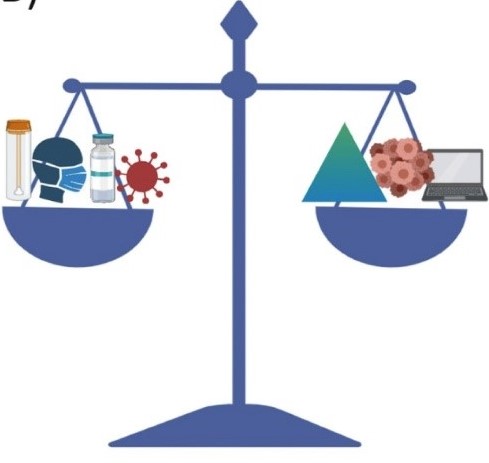The coronavirus disease (COVID-19) continues to spread globally at an alarming rate, influencing all sectors of our society. The burden of COVID-19 on health systems has important implications for cancer prevention and treatment, including:

j.trecan.2020.04.005
- an increased risk of infection for cancer patients,
- the suspension of screening, and
- the de-prioritization of other cancer care services, including diagnosis and treatment.
These changes have had and will continue to have a profound impact on the lives of cancer patients and their families, as well as care providers. Patients with cancer are known to be at increased risk for community acquired respiratory viruses due to their immunocompromised state, and are vulnerable to worse outcomes from the infection. They might be more likely to get infections because of the cancer itself, certain cancer treatment modalities, poor nutrition, and other co-morbidities. Patients are also worried about potential exposure to this infectious disease, and have been reluctant to seek health services out of fear that they will be exposed to the virus.
Additionally, many aspects of the cancer care continuum have been suspended to enable health systems to respond to the pandemic. The American Society of Clinical Oncology recommends, “to conserve health system resources and reduce patient contact with health care facilities,… that cancer screening procedures that require clinic/center visits, such as screening mammograms and colonoscopy, be postponed for the time being.” The dramatic reduction of testing has led to a significant decline in newly identified patients with six common types of cancer.
While COVID-19 preventive measures, such as social distancing and mask wearing are being taken to control the pandemic, cancer has not paused or slowed down. Cancer care and treatments have been deprioritized – nearly 80% of people in treatment have experienced some delay in care due to the pandemic. This delay will lead to the presentation of more advanced stages of cancer, poorer clinical outcomes, and elevated cancer-related mortality rates. One study suggests a potential increase of 33, 890 excessive cancer deaths in the United States.

To protect the health of cancer patients during times of high risk, the cancer care team should focus on enhancing communication and care coordination. To minimize risk, patients should be informed about their increased risk of infection, and precautions that need to be taken to decrease the chance of contracting COVID-19. For instance, this could include sharing the US Centers for Disease Control and Prevention’s (CDC) specific recommendations for people at risk for serious illness from COVID-19 infection with patients. In addition to general guidelines, patients need to be aware of individual risk as relative risk is typically case-based and needs to be tailored to the individual. Timely communication between members of the patient’s care team is also crucial to ensure all providers are informed about the care process. Engaging with patients and providing useful information can help alleviate some anxiety around risk of virus exposure and seeking care during a pandemic.
The backlog of patients in need of cancer care could overburden the health system in the years to come. Planning is needed at all decision-making levels to address the backlog and lessen its impact. In addition to the continuous need for cancer research funding and better access to health care and screenings, certain tools and solutions need to be incorporated into care to enhance system efficiencies, including the use of more robust digital technologies. These technologies include self-service scheduling across cancer care specialties, data collection (i.e. patient-reported outcomes and test results) tools and processes, and telehealth supports.
Equicare Health Inc., the leading provider in oncology care coordination and patient navigation solutions, allows for enhanced communication between healthcare providers, patients and their families through many avenues. This platform allows for patient appointment reminders and automatic assignment of questionnaires to patients based on compliance goals and clinical needs. Patient reported outcomes (PROs) and questionnaires allow self-reporting of symptoms that provide invaluable information for timely risk management and assessing the overall effectiveness of cancer interventions. In addition, care providers can connect with patients and their care team through video conferencing through EQUICARE CONNECT, a secure and cloud-based platform.
These tools have proven that enhanced communication and a well-coordinated system is not only advantageous for the patient, but also the care team, and healthcare system. Inherently, these digital supports will foster positive relationships and trust between all stakeholders involved. Strong connections between patients and providers, as well as within care teams, is critical at all times during the entire cancer care continuum, but even more so during a global pandemic.
Written by Dorri Mahdaviani , who holds a Masters of Public Health (MPH) from the University of British Columbia (UBC). Her academic and professional interests include the areas of chronic illnesses and health systems.